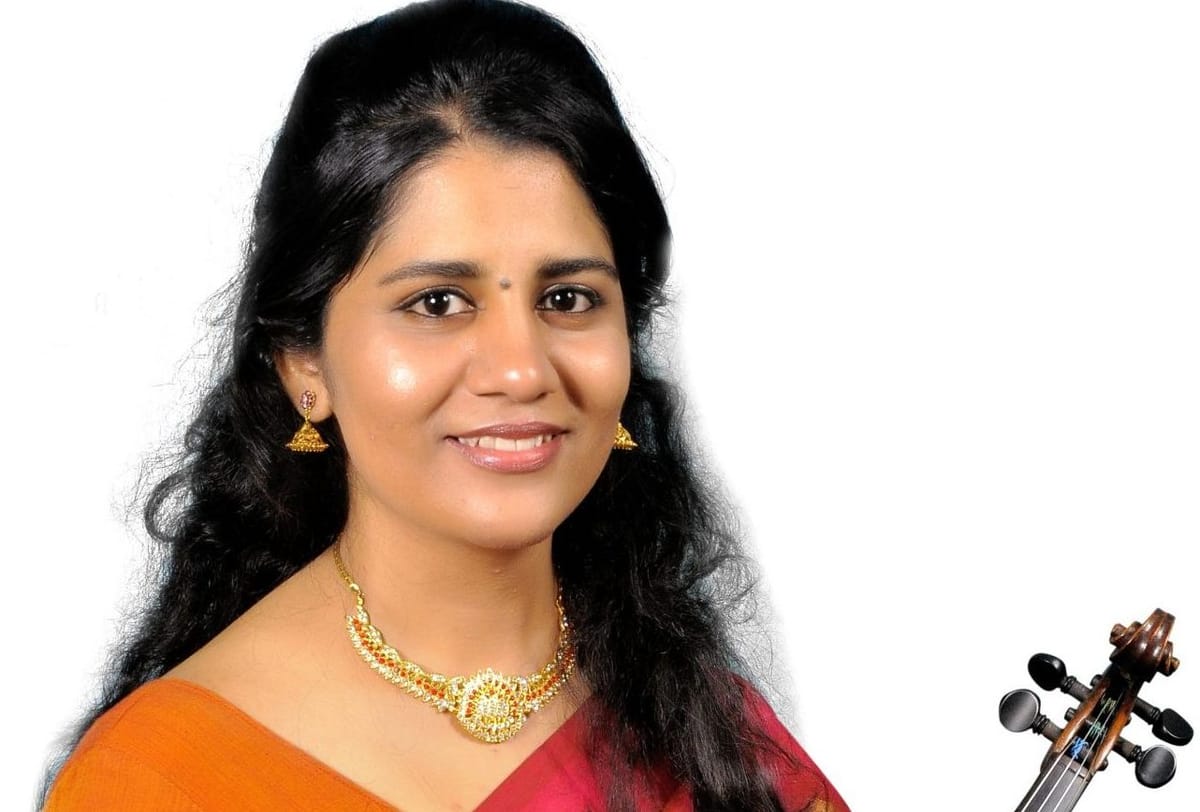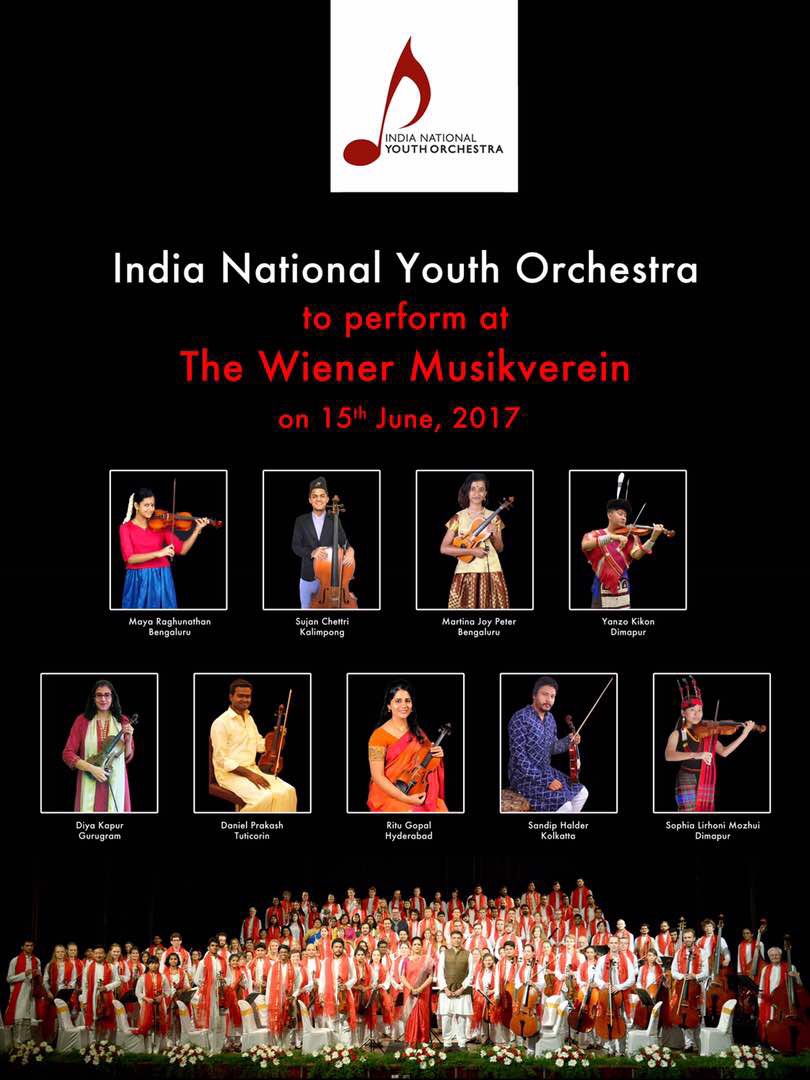Violin, Fusion and Global Thought on Music – Conversations with Ritu Gopal

We seldom come across musicians who have a global approach towards music and appreciate the oneness behind the creation of the same. While many of the younger generation are slowly edging towards Western Music despite their Indian roots, one vibrant violinist named Ritu Gopal has followed the same path but in her own style. Her entry into India National Youth Orchestra and Chorus is quite a rewarding milestone in her career and she will be performing along with nine other Indian musicians on June 15th in Vienna – the hub of Western classical music. She strongly believes that Music has the inherent ability to bring a positive change even in people with disabilities and has worked on a similar theme involving children with autism.
Navya Chittarvu: Hello Ritu! Can you please tell us about your background?
Ritu Gopal: I was singing right from the age of seven and thanks to the musical foundation given by my Dad who is a great music listener and my mother who loves to sing; I was introduced to Carnatic and Hindustani classical music at an early age. I started learning violin at the age of seven and completed my eighth grade at the age of 12. I have had great encouragement in my family to pursue music as a passion and they happen to be great admirers of western classical music. I started learning Western violin and at the age of 19. I auditioned for India National Youth Orchestra and Chorus and also started teaching violin then. I am holding a diploma in Violin performance from ABRSM.
I was hardly 18 years old when I came to know about the audition. I was playing for Bombay Chamber Orchestra and traveling to study violin there at that time. I was randomly searching for auditions all over India on Google. That was when I came to know about the auditions for National Youth Orchestra that I immediately attended the same.
NC: What were your earliest influences in music?
RG: I belong to a background where I was taught to appreciate all forms of music dearly. I had equal amounts of exposure in both Indian and Western classical music in that regard. I was particularly drawn towards A.R.Rahman’s semi classical songs and often performed them on stage. I was singing Pop and Rock songs from US radio during my stay and started learning violin after returning to India. It can be really called coincidental but I started learning violin so that I could perform along with my sister on stage (smiles).
This upcoming concert will be a challenging one because we will be performing a 20th century piece, Carl Orff’s Carmina Burana along with 100 musicians and 400 singers at the Golden Hall in Vienna.
NC: How was the experience auditioning for India National Youth Orchestra?
RG: I was hardly 18 years old when I came to know about the audition. I was playing for Bombay Chamber Orchestra and traveling to study violin there at that time. I was randomly searching for auditions all over India on Google. That was when I came to know about the auditions for National Youth Orchestra that I immediately attended the same. My first concert with them was in Kolkata and it was then that I came in contact with musicians from various parts of the country. It was indeed overwhelming. Some of the artistes were from Vienna and the cultural exchange and learning which happened during that phase is unbelievable. We come together twice a year to perform and each time it is a learning experience.

NC: Please tell us about your upcoming concert with the India National Youth Orchestra in Vienna.
RG: This upcoming concert will be a challenging one because we will be performing a 20th century piece, Carl Orff’s Carmina Burana along with 100 musicians and 400 singers at the Golden Hall in Vienna. The conductor Vijay Upadhyaya and the managing director Ms. Sonia Khan have worked quite hard for this show and are keen on making it a memorable one. I am really looking forward to perform in this venue as it is a rare honour and I would be representing my city Hyderabad as well. I sincerely thank the Indian Council of Cultural Relations, Ministry of Culture India, Indian Embassy in Vienna, Embassy of Austria in India for their immense support for this once in a lifetime event.
NC: A short word about the other musicians who are traveling with you to Vienna?
RG: I am really amazed to travel with a rare breed of talent from India such as Yanzo Kikon and Sophia Mozhui from Nagaland, Maya Raghunathan and Joy Peter from Bengaluru, Daniel Prakash from Tuticorin, Sandip John Halder from Kolkata, Diya Kapur from New Delhi and Sujan Chettri from Kalimpong. They will be representing India at a global stage with their amazing talent and individual style. It is an honour to perform along with them.
Mr.Vijay Upadhyay is someone who has a complete global approach towards music and his interpretation of Tamil and Malayalam folk songs in western lens intrigue me.
NC: Which musical role do you prefer-is it a soloist or part of orchestra?
RG: When I play as soloist or in small settings, I get a rare chance of interpreting the piece on my own and improvise on it to my heart’s content. There is a little scope for team work in this regard and that’s why I find performing in an orchestra even more rewarding. A definite structure, complimenting each other through music and most importantly, making music together is something which can be attained only in an orchestra and it is a different discipline altogether.
NC: Did you find the influence of Indian music forms helpful while learning Western Violin?
RG: Carnatic music has inculcated a strong sense of cultural aspects, emotional connect and improvisation of a piece. However, the main aspect which I adapted in Western Classical learning was learning by the ear. Carnatic music is quite intuitive in nature and goes beyond realms in interpretation for sure.
The world is becoming a global village with more people from different backgrounds associating together without egos. I also believe that Music has a global aspect to it which can create collective consciousness and positive energy all over.
NC: How was your working experience with Mr.Vijay Upadhyay, the conductor of India National Youth Orchestra?
RG: Mr.Vijay Upadhyay is someone who has a complete global approach towards music and his interpretation of Tamil and Malayalam folk songs in western lens intrigue me. We happened to do a 40 minute long folk song and it gave an entirely new hue for the composition when conducted in western style. National Youth Orchestra might be a Western platform but we never forget the Indian roots- even in the costumes we wear! They are quite ethnic and earthy in nature defining the Indian flavour throughout.

NC: Some of your influences in violin playing?
RG: I’ve always admired Kunnaikudi Vaidyanathan sir’s violin style for his fun element and flawless playing. In Hindustani Classical, I am amazed by N.Rajam’s playing as well. Coming to Western realms, I really get inspired by Ginette Neveu, a French violinist who had an incredibly short life but created some magical work. Christian Ferraes is fantastic and Yehudi Menuhin’s writings about music is exemplary.
NC: Do you think Music has the ability to solve global issues?
RG: Definitely. The collective energy felt during performing an orchestral piece is something inexplicable. When a song is made based on a social issue, it would absolutely reach a wider audience and get even more appeal. I personally feel that we are in the best era of Music because many young artists are coming together, keeping their boundaries and limitations aside to create some mesmerising music. The world is becoming a global village with more people from different backgrounds associating together without egos. I also believe that Music has a global aspect to it which can create collective consciousness and positive energy all over.
NC: Thank you and wish you the best for your upcoming concert!
RG: Thanks a lot!





